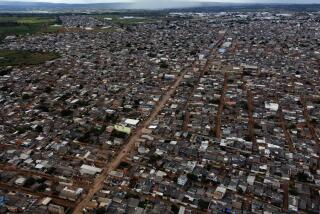The Cutting Edge: COMPUTING / TECHNOLOGY / INNOVATION : Fenasoft Show Signals Brazil’s Rising Status as a World-Class Market
- Share via
SAO PAOLO, Brazil — It has all the glitz of Comdex and other major computer shows: large, plush exhibits from Apple, Compaq, Microsoft and other major computer vendors, entertainment ranging from karaoke singers to a tuxedo-clad orchestra, and scantily clad “booth babes” to lure potential buyers.
But in many respects the Fenasoft computer show here is altogether unique. It is, for starters, enormous: Organizers say the show, which runs through Friday, attracted 650,000 attendees last year, and the massive Anhembi exhibit hall--the world’s largest aluminum structure--was almost impassable Tuesday when the exhibition first opened to the public.
And Fenasoft provides an interesting window on the evolution of the Brazilian economy and the belated emergence of a technology sector. For decades, some of the world’s highest tariffs and other import barriers protected a domestic computer industry but kept Brazil far outside of the global technology mainstream. But since President Fernando Henrique Cardoso took office last year, many of those restrictive economic policies have been reversed, and a chronic hyper-inflation problem appears to have been tamed.
Import tariffs on PCs and other computer hardware have been reduced from about 100% to 40%, and will continue to decline in the future. Import duties on software have been eliminated entirely, although there is still a 17% tax on the price of the products and a $1-per-disk duty on the cost of goods.
What’s more, the government is offering substantial tax incentives to overseas companies willing to build computers here. Compaq recently opened a PC factory capable of producing 400,000 machines a year for distribution in Brazil and other South American countries. And it has just opened a disk-duplication facility here: It plans to begin shipping a localized, Portuguese-language version of Windows 95 on Aug. 24 when it releases its English-language version.
Clearly, the demand for U.S. computer goods among Brazil’s middle and upper classes is enormous. At Fenasoft--which, unlike most Comdex, is a cash-and-carry show where the public can buy products--the computer-hungry public was more than willing to shell out a $30 entrance fee just to come inside. People leave the halls toting bags of software and boxes of peripherals as well as complete computer systems.
The scene at the show stands in stark contrast to the poverty that affects so many in this vast country. Greater Sao Paulo, home to 22 million people, is dotted with favelas, shantytowns where thousands of people live in makeshift structures. With a per-capita income of $2,350, about two-thirds of Brazil’s 158 million people live below the poverty line. Nevertheless, says Stephen Banker, Fenasoft’s foreign media spokesman, “that leaves a population the size of France that is participating in the economy.”
Fenasoft president Max Goncalves says the market is expected to grow from a million a year in sales this year to 10 million by the year 2000.
In addition to the large U.S.-based international companies like IBM, Lotus, Novell, and Compaq, there were about 120 small U.S. firms that exhibited at the behest of the U.S. Department of Commerce. Robert Pata, a San Francisco-based trade specialist for the Commerce Department, explained that “the overseas market can mean survival for a small high-tech company.”
Gary Lang, a Long Beach-based trade specialist for the California Office of Export Development, escorted 28 California companies to the show. “We see Brazil as one of the 10 big emerging markets which we want to expose to California computing companies. We can’t ignore a market the size of Brazil,” he said.
The show did have its share of hassles. Most foreign Fenasoft visitors, myself included, got through customs without a hitch, but some exhibitors had their products confiscated because of trivial documentation errors. One exhibitor, who asked not to be identified, had his personal laptop taken.
Another problem for foreign companies is that the rules for selling to the Brazilian government are tougher than with the private sector. “In Brazil, the government is still the largest consumer of computers and software,” said Pata. ‘And there are still laws favoring Brazilian products,” he added. “Brazil argues that their the policy is similar to that of the U.S., which is true, but in the United States, the government represents a much smaller percentage of the market.”
Three days in Brazil hardly makes me an expert on its culture or economy, but attending this trade show--which I did at the expense of the sponsors to speak on panels and help judge the product awards--reminded me, in some ways, of my visit to Berlin in May, 1990. The Wall was down, but Checkpoint Charlie was still in business. Brazil is a country in transition and Fenasoft exemplifies its efforts to be taken seriously as a market and producer of world-class software and hardware.
*
Computer File welcomes your comments. Write to Lawrence J. Magid, Computer File, Los Angeles Times, Times Mirror Square, Los Angeles, CA 90053, or message magid@latimes.com on the Internet or KPVN58A on Prodigy.




